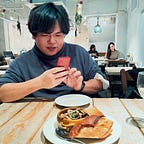When Rainbow Flags Make It To National Television
When I started college, there already existed prides and rainbow flags. I didn’t have to create queer spaces to join or queer symbols to identify with. They were there, and I’d join rainbow-filled events and groups. And I was constantly disappointed with how those events were trans-indifferent, gay men-centered, obsessed with money and reputation, anti-intersectional, ethnocentric, disability-unfriendly, male-dominated, etc. etc.
For me, rainbow has always been a symbol of the ideal that we collectively aim at, something we go back to when lost in direction and imagination. It’s a symbol that reminds us of who we might leave behind if we stop caring for the entire community but those who are like “us.” That’s what it should be, and that’s why many of us queers work hard to make/keep rainbow spaces inclusive and try to stay humble when confronted with criticisms, and hold accountable those who do not live up to what the symbol represents.
Most queers do not automatically identify with rainbow flags. Identifying with them requires constant work. The sense of community is hard to achieve and many of us try hard to make rainbow feel like “ours” by joining events and groups imperfect but *close enough*. It precisely feels like fitting in at school and you know what I mean if you were neither one of the “cool kids” nor one of the happy outsiders. If you were like me, you probably did the background color paint on the cardboard so the cool kids could do cool painting on it for a school project. You were there, but you could’ve been anyone. For me, queer events always feel like that school project that I was invisibly part of, that I could not ditch and go home because I was not happy enough an outsider.
That’s why, that’s why we should not place rainbow flags in a nationalistic TV program that celebrates Japan’s Imperial family & the Olympics. NHK’s annual end-of-the-year music program, Kouhaku Utagassen, where musicians are divided into two competing teams of red (women) and white (men), did just that on New Year’s eve, 2019.
MISIA, the singer who performed with drag queens and numerous rainbow symbols on the stage, is a gay icon and a long-time ally who has helped raise awareness about sexual diversity through music, performance, and collaboration with gay men. That, I don’t have a problem with (I just hope that she’ll start doing the same with the lesbian, bi, and trans communities).
But the underlying theme of the entire program is national unity, with the utterances of words like Reiwa (Japan’s new imperial reign period that started earlier last year) and the Olympics recurring throughout the program. MISIA’s rainbow-filled performance, in such a nationalistic context, might be understood as a call for queers to join the “diverse Japanese nationals” bandwagon, or in other words, it can be understood as the formerly government-owned broadcasting company’s homonationalist tactics.
Not the singer’s fault, obviously, but as someone who needs to work hard to identify with the rainbow symbol, someone who stayed after school only to paint the background so I could be part of the project, I was almost compelled to applaud. I still feel like I should feel happy to see rainbow symbols in Kouhaku because it’s such a big event and by feeling happy about it, I could announce to the world that I am part of the queer community, a legitimate member of it, indeed.
But that would have meant I’d have to forget, at least for a moment, about my family and friends who are not welcomed members of the Japanese society.
That’s why, that’s why rainbow symbols, which supposedly represent all queers and their diverse lives, should not be used like this. We should not use them in a way that tempt queers, especially ones who already feel alienated within the community, to identify with them in contexts of injustices.
I wrote an article about this in Japanese for Wezzy. If you read Japanese, here’s the link.
https://wezz-y.com/archives/71794
#NHK #Kohaku #Kouhaku #MISIA #LGBTQ #LGBT
*If you believe that nationalism is just, this post isn’t for you. Don’t even think.
*Cover photo has been taken off of MISIA’s official website.
Originally published at http://gimmeaqueereye.org on January 10, 2020.
